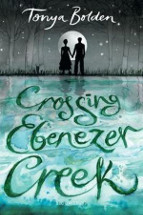Crossing Ebenezer Creek by Tanya Bolden

Bloomsbury, 2018. ISBN 9781681196992
(Age: 13+) Recommended. In the latter months of 1864, during the
U.S. Civil War, General Sherman of the Union led a huge army through
Georgia, freeing slaves, plundering goods and destroying property of
the vanquished. Many ex-slaves chose to accompany the advancing army
on the march. Many would have seen the Northern soldiers as
saviours, some depended upon their rations and some undoubtedly
wanted to participate in and witness the defeat of the Confederate
South.
The Union army was glad to have the labour from thousands of willing
workers for transporting equipment, foraging food and building
pontoon bridges to replace those destroyed by the retreating
Confederates. Accompanying the principally male ex-slaves engaged in
military support were the women, children and elderly from their
families or dependants from their previous life of servitude.
This story centres upon Mariah, a young woman whose main focus after
being freed is the protection of her intellectually disabled young
brother by establishing a home on one acre of land, upon which she
can grow food. From her recollections, the reader comes to
appreciate some of the abject misery and brutal cruelty endured by
slaves in the American South. It is difficult to imagine conditions
in an era when those who considered themselves part of civilised
society might sell children away from traumatised mothers, would
inflict barbaric, degrading punishments for the slightest of
perceived misdeeds and could ultimately end a slave's life.
Liberated from tyranny, these ex-slaves rejoiced in freedom but
faced the fact that they were ill prepared for life ahead, having no
land or property and usually no education. When Mariah meets Caleb
(a skilled black man working for the Union Army) she recognises his
kind, gentle and decent nature and a romance develops which would
have been realistic under the circumstances.
The climax of this story involves an historically accurate event
which should be shamefully acknowledged and remembered, yet appears
to have been buried and forgotten in the mists of time.
Young readers may be confused by the opening sequences of this
story, especially if they have no knowledge of slavery in the
American South. It may be difficult for those unfamiliar with
plantation life and conditions to understand the various characters
who are introduced in the early passages, yet if they persist, they
will be better for learning about this profoundly important chapter
of history.
Recommended for readers 13 years+
Rob Welsh